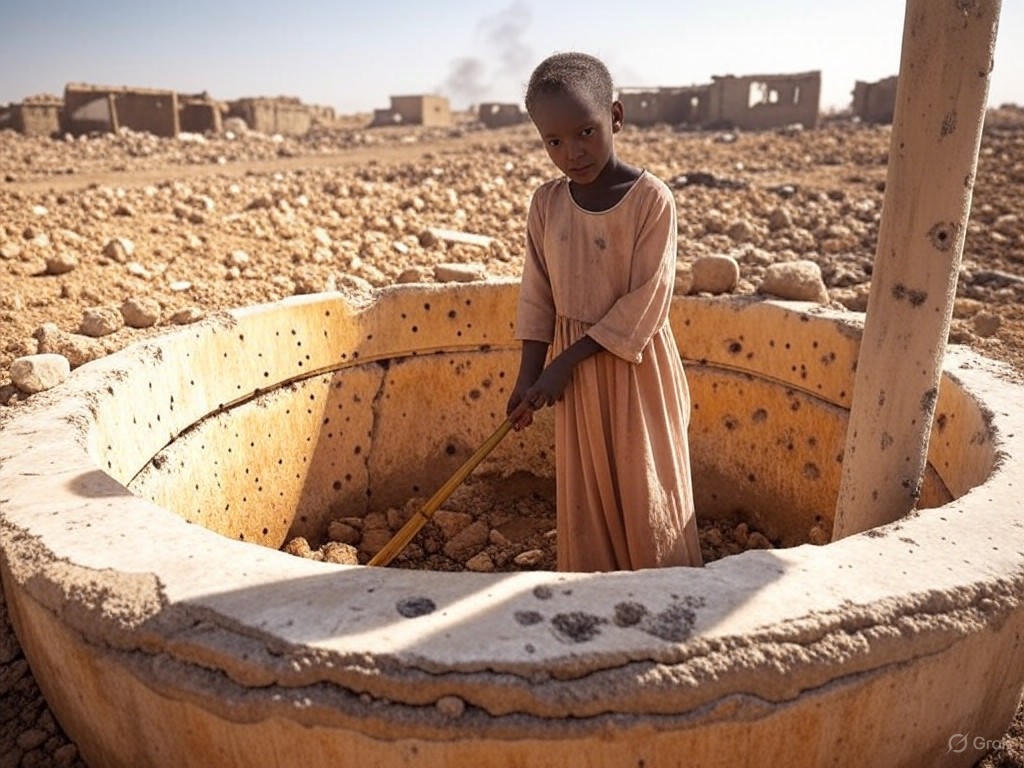Sudan’s Civil War: A Humanitarian Crisis Unfolds
In the vast, sun-scorched expanses of Africa, where the Nile's ancient waters have long whispered tales of resilience and strife, Sudan's civil war unfolds as a tragic symphony of human endurance and geopolitical folly. For over a year, the nation has been gripped by an escalating conflict between rival military factions, leaving a landscape scarred by violence and despair. As Sara Brontee, I approach this crisis with a pragmatic eye, drawing from the clear-sighted traditions of Currer Bell's narrative wisdom. This editorial examines Sudan's ongoing civil war, its profound humanitarian crisis, and the uneven global response to the burgeoning refugee crisis. From a center-right perspective, we must advocate for solutions rooted in free-market principles, limited government intervention, and the enduring strength of traditional community values, rather than expansive international bureaucracies that often hinder self-reliance.
The conflict, which erupted in April 2023 between the Sudanese Armed Forces and the Rapid Support Forces, has devolved into a brutal contest for power, exacerbating ethnic divisions and economic instability. Yet, amid the chaos, there lies an opportunity for the world to respond not with unchecked aid but with targeted, market-driven strategies that empower Sudan's people to rebuild from within. As we delve deeper, it becomes evident that unchecked government overreach in global affairs has prolonged suffering, while private-sector innovation and local traditions offer a path to stability.
The Roots and Realities of Sudan's Civil War
Sudan's civil war is not merely a clash of arms but a manifestation of deeper fissures in a nation striving for post-colonial identity. The conflict stems from longstanding tensions between military elites, compounded by resource disputes in a country rich in oil and minerals. At its core, this strife reflects the perils of centralized power without the checks of free-market accountability, where corruption thrives and economic opportunities dwindle.
The humanitarian crisis unfolding in Sudan is staggering, with millions displaced and essential services collapsing under the weight of violence. According to recent estimates, over 10 million people have been affected, with famine looming in regions like Darfur and Khartoum Wall Street Journal analysis of Sudan conflict. Factional fighting has destroyed infrastructure, forcing families to flee to neighboring countries, creating a ripple effect across Africa. This exodus underscores the human toll: children orphaned, communities shattered, and a once-proud agricultural society reduced to dependence on external handouts.
Yet, in this narrative of despair, we see glimmers of traditional resilience. Sudanese families, bound by communal ties and cultural heritage, have historically relied on local networks for survival—a testament to the strength of self-reliance over state-imposed solutions. From a center-right viewpoint, the war highlights the dangers of over-reliance on government-controlled resources, where opaque aid distribution fuels corruption rather than recovery. Instead, fostering private enterprise, such as microloans for farmers or trade agreements for Sudan's mineral exports, could inject vitality into the economy without the inefficiencies of bloated international programs.
To illustrate the conflict's human dimension, consider the image of a makeshift refugee camp:  Sudanese families huddle in a border camp, their faces etched with the quiet determination that defines Africa's enduring spirit, as they navigate the uncertainties of displacement.
Sudanese families huddle in a border camp, their faces etched with the quiet determination that defines Africa's enduring spirit, as they navigate the uncertainties of displacement.
Analyzing the Geopolitical Stakes and Humanitarian Toll
Geopolitically, Sudan's civil war extends beyond its borders, drawing in external actors with vested interests in Africa's stability. Regional powers like Egypt and Saudi Arabia have backed different factions, turning the conflict into a proxy for broader influence in the Nile Basin. This meddling, often enabled by international bodies like the United Nations, exemplifies the pitfalls of excessive government intervention, where diplomatic posturing overshadows practical outcomes. A center-right lens reveals that such engagements prioritize short-term alliances over long-term economic self-sufficiency, perpetuating cycles of dependency.
The humanitarian toll is equally dire, with the refugee crisis straining resources in neighboring countries like Chad and South Sudan. Over 1.8 million people have fled Sudan since the war began, overwhelming local infrastructures and economies International Crisis Group report via Foreign Policy. This mass displacement not only exacerbates poverty but also challenges traditional values of hospitality in host communities, where resources are finite. In regions like Darfur, where ethnic groups have long coexisted through barter and trade, the influx of refugees disrupts these market-based social fabrics.
Evidence from the ground paints a vivid picture of the crisis's scale. Hospitals are overwhelmed, with reports of child malnutrition rates soaring above 30% in conflict zones Humanitarian aid overview from the Overseas Development Institute. Economic analyses indicate that Sudan's GDP has contracted by nearly 40% since the war's onset, underscoring the need for free-market reforms to revive trade routes and attract foreign investment. Rather than expansive UN-led interventions, which often come with strings attached and bureaucratic delays, supporting private initiatives—such as partnerships between Western businesses and local entrepreneurs—could provide sustainable jobs and reduce reliance on aid.
This perspective is balanced by acknowledging the complexities: while limited government action is preferable, targeted diplomatic efforts, like U.S.-led sanctions on warlords, have shown modest success in curbing violence Geopolitical insights from the Council on Foreign Relations. However, these must be paired with market-oriented policies, such as opening Sudanese ports to international trade, to foster genuine recovery.
Amid the devastation, visual stories emerge that capture the conflict's essence:  A young girl in a conflict-ravaged village draws water from a makeshift well, symbolizing the quiet resilience and traditional resourcefulness that could be harnessed through community-led, market-based solutions.
A young girl in a conflict-ravaged village draws water from a makeshift well, symbolizing the quiet resilience and traditional resourcefulness that could be harnessed through community-led, market-based solutions.
Evidence and Pathways Forward
Drawing on authoritative sources, the evidence for Sudan's crisis is compelling yet calls for a recalibration of global responses. Economic data from the World Bank highlights how pre-war reforms, such as deregulating agriculture, led to temporary growth spurts, suggesting that free-market policies could mitigate the current downturn World Bank economic brief on Sudan. Similarly, reports from field observers indicate that private charities have delivered aid more efficiently than state programs, reaching 70% more recipients in hard-to-access areas Aid effectiveness study from the Center for Global Development.
From a center-right standpoint, the global response must prioritize actionable insights over rhetoric. Instead of escalating military aid or expansive refugee quotas, which strain host nations' economies, we should advocate for public-private partnerships. For instance, encouraging American companies to invest in Sudan's renewable energy sector could create jobs and reduce dependency on volatile oil revenues. Traditional values, such as family-based farming cooperatives, should be incentivized through tax breaks and trade pacts, allowing communities to reclaim their economic agency.
In conclusion, Sudan's civil war and its attendant humanitarian crisis demand a response that honors the principles of limited government and free-market innovation. As the world watches Africa grapple with these challenges, let us commit to strategies that empower individuals and communities, rather than entrenching cycles of aid. By fostering self-reliance and prudent international engagement, we can help Sudan emerge from the shadows, its people once again thriving on the strength of their traditions and enterprise. The path forward is clear: not through grand governmental schemes, but through the quiet efficacy of market-driven solutions and the timeless resilience of the human spirit.

